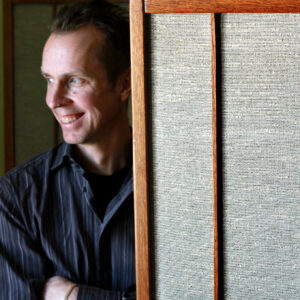Creator Profile
Bio

Omar Daniel has composed extensively in solo, chamber, electronic and orchestral idioms, and was the 1997 recipient of the Jules Lèger Award for New Chamber Music. Other composition awards include the 2007 K.M. Hunter Arts Award, the SOCAN National Competition for Young Composers and the CBC National Radio Competition for Young Composers. He hasn’t won an award in a while now, but hopes to cash in if someone creates a competition for old timers. He is also an active pedagogue, and holds the position of Associate Professor in Composition at Western University.
Daniel's music is characterised by a strong sense of drama (in the Aristotlean sense, which perhaps categorizes him as a classicist). His style is firmly rooted in the European concert-music tradition (which perhaps characterizes him as out of touch with the times), and exhibits a broad palette of instrumental colour, intricate harmonic language, a strong rhythmic profile and rigorous architectural design. At least according to him.
Born in 1960, Daniel grew up in the experimental community of Don Mills (now part of the Greater Toronto Area). The first ‘suburban community’ built in North America, it was populated by a diverse collection of citizenry, including asylum seekers from the Second World War. Daniel’s parents were refugees from Estonia, the northern most Baltic state, which was occupied by the Soviet Union in 1945. There was a piano in the family home, and although both of his parents were respectful of the arts, Daniel’s childhood and youth were spent mostly studying STEM related subjects, along with endless hours of swimming and track and field training. He can still throw the javelin quite far. But, the piano made an impact, and was a way into the rich world of classical literature. Along with this growing interest in classical idioms, Daniel was keenly interested in popular music, co-founding the Richmond Hill/Toronto rock band Spectrum (not to be confused with the highly successful Australian band founded in 1969, or the even more successful British band formed in 1991). Daniel surprised and confounded almost everyone in his final high school year by proclaiming an interest in pursuing a Bachelor of Music, and subsequently spent a seemingly endless four years obtaining a Bachelor of Music in Theory and Composition from the University of Toronto in 1983. He studied with all the notable composition/theory icons of the day: John Beckwith, Lothar Klein, Walter Buczynski, John Weinzweig, Gus Ciamaga, Derek Holman, Edward Laufer, John Hawkins and John Kruspe. And, he had the privilege of studying piano with Clifford Poole, whose wisdom made a great impression. During the early years of study at UofT, Daniel worked at the iconic El Mocombo tavern in Toronto, where he could observe first hand the ‘up and coming’ musical acts of the day. The most memorable experience he cites is during his second day on the job, when he and several other bouncers carried a half-concious Meatloaf back onto the stage for his second encore, oxygen bottle in hand. Daniel, to the best of his recollection, has been knocked unconscious only twice in his life: once while waterskiing during his tenure as waterski instructor at the idyllic camp of Geneva Park in Orillia (although there may have been more than one knock-out event that have now blurred into one), and while rushing to the aid of other bouncers during a dust-up at the El Mocombo.
In the mid-1980’s Daniel studied with Alexander Goehr in England. This was not as important an episode in Daniel’s life as he had hoped, but in no way because of the gentle, charming and fantastically knowledgeable Goehr. Daniel simply became infatuated with the hundreds of castle ruins that dot the British countryside, and took it upon himself to visit every last one of them instead of composing.
Upon returning to Canada, Daniel began a PhD in Composition at the University of Toronto, studying with John Beckwith and Lothar Klein. As well, with composition and performance colleagues at U of T he founded the new music group Continuum as a way of creating performance opportunities. Presenting concerts at the Music Gallery (followed by dinners at the Elvis restaurant), the group came to the attention of the singular David Jaeger, who agreed to record several concerts for radio broadcast. Daniel cites his ongoing relationship with CBC radio, and David Jaeger in particular, with any compositional success he had during his formative years and indeed to this day. Slowly, opportunities for commissions arose with key presenters taking a chance on Daniel: Eli Kassner and the Guitar Society of Toronto (Daniel’s first ‘real money’ commission), Alex Pauk and Esprit Orchestra, Bob Aitken and New Music Concerts, Kazuyoshi Akiyama and The National Youth Orchestra of Canada, Lawrence Cherney and Soundstreams, Vincent Ho and The Land’s End Ensemble, Wayne Strongman and Tapestry Opera, as well as many individual musicians whose names appear as dedications on Daniel’s scores. The most notable of these individuals is his wife Erika Raum, for whom he has had the privilege of writing many violin works. It was also a privilege to accompany her on the red carpet at the Grammy Awards in 2017 (to be clear: she was the nominee, not Daniel). And, the supreme privilege was to witness the birth of their four children (three at once).
Daniel’s Estonian heritage is evident in his recent compositional interest: the integration of ancient Estonian folk songs (Regilaulud) into his compositions. This has resulted in a number of important compositions: Metsa Maasikad (Wild Strawberries), Mehetapja (The Husband Killer) Üheksa Eesti Regilaulud (Eight Estonian Runo-songs), Violin Concerto and Mehetapja Meeli Unistus (The Husband Killer’s Dream). His choral work Södri Ema was written for the Estonian Philharmonic Chamber Choir (commissioned by Soundstreams), and he is currently working on the opera Mehetapja (The Husband Killer) based on an Estonian folk tale.
His creativity extends to electroacoustic music as well. His innovative, disconcerting (and physically risky) The Flaying of Marsyas has been performed many times by Daniel and Erika Raum since its creation in 2001, and his Annunciation for string quartet and electronics has been performed over twenty times by the Penderecki String Quartet in Canada, the U.S. and Europe. In the spring of 2016 his new work for Theremin, Hammond organ and string quartet was premièred by Theremin virtuoso Carolina Eyck. He was thrilled that he could include the Hammond L-100 that he picked up at an antique store. His kids now use it to play Kansas and Radiohead.

